译林版(2020)必修第二册Unit 2 Be sporty, be healthy Extended reading课件(共26张PPT)
文档属性
| 名称 | 译林版(2020)必修第二册Unit 2 Be sporty, be healthy Extended reading课件(共26张PPT) | 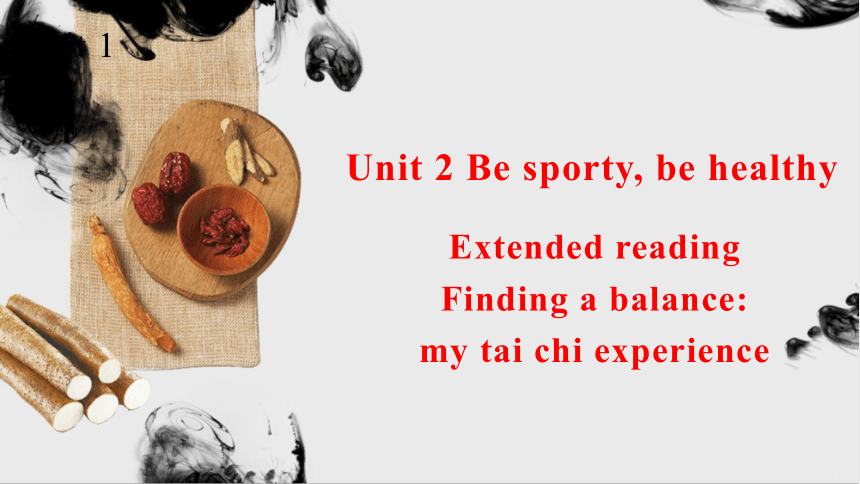 | |
| 格式 | pptx | ||
| 文件大小 | 5.0MB | ||
| 资源类型 | 教案 | ||
| 版本资源 | 牛津译林版(2019) | ||
| 科目 | 英语 | ||
| 更新时间 | 2024-03-21 19:16:15 | ||
图片预览

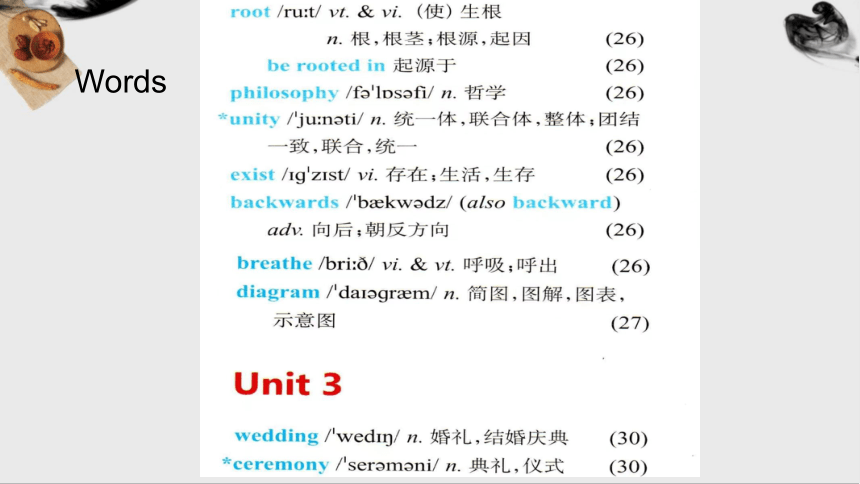
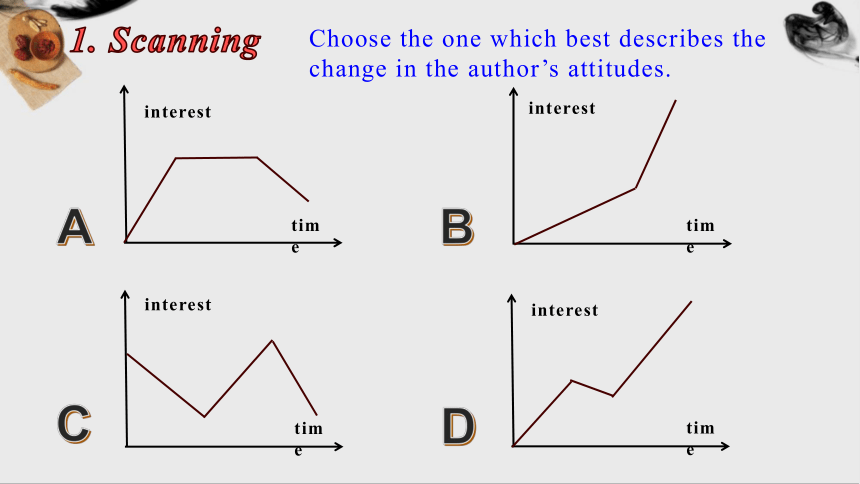
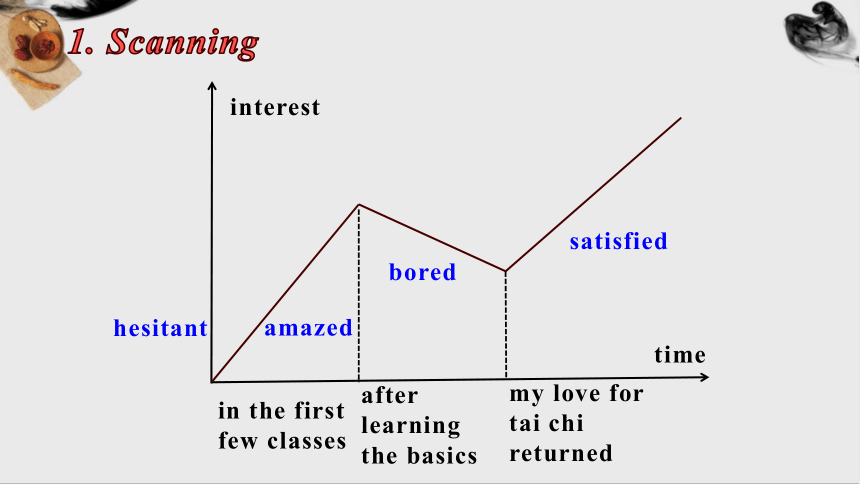
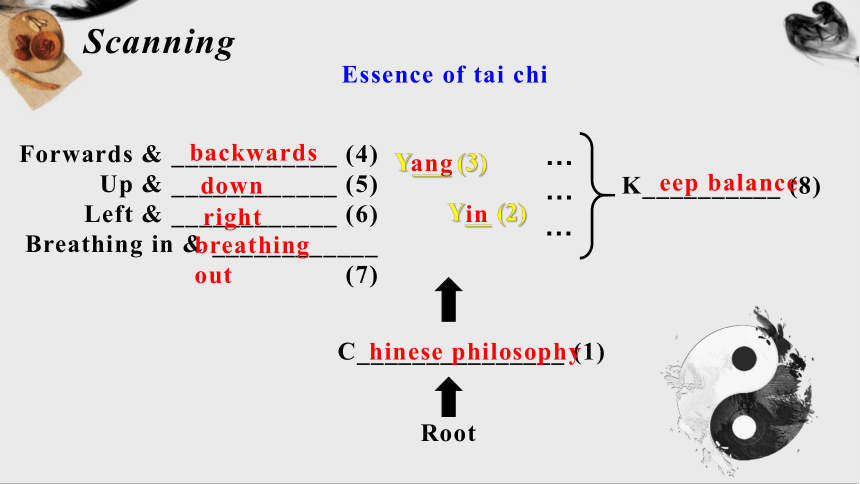
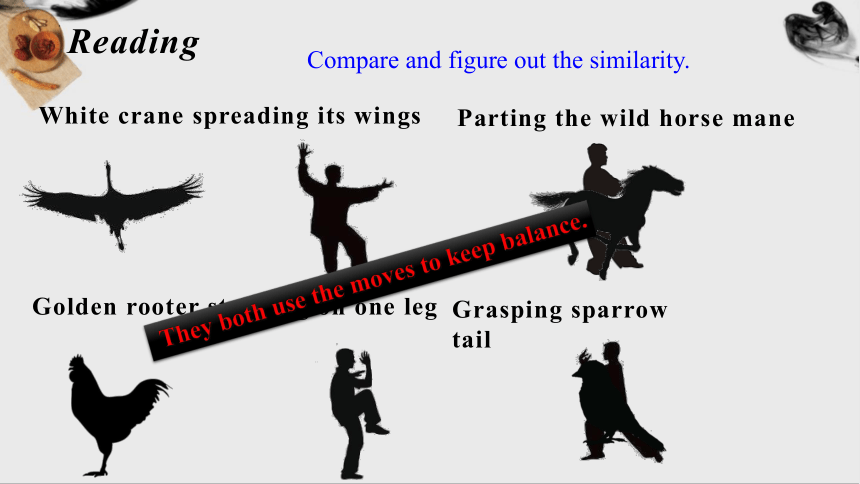
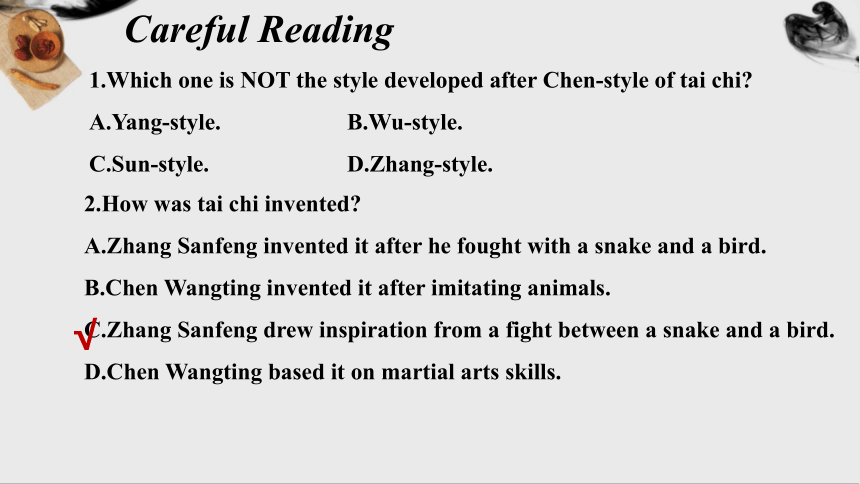
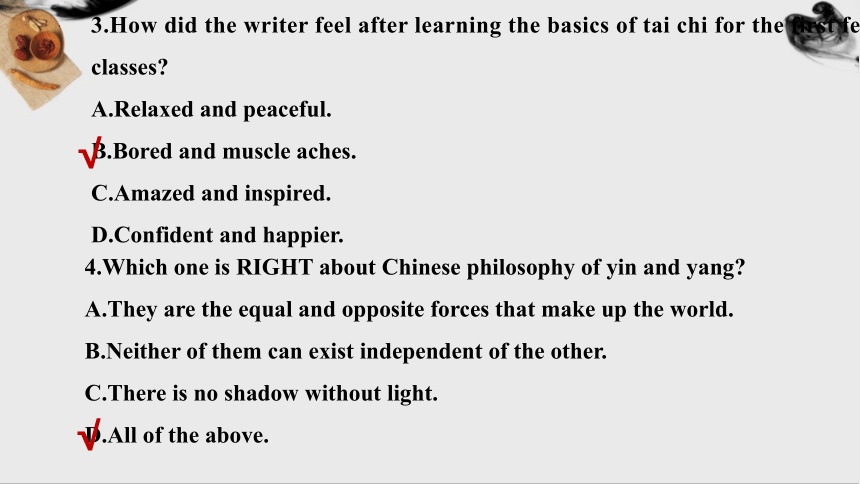
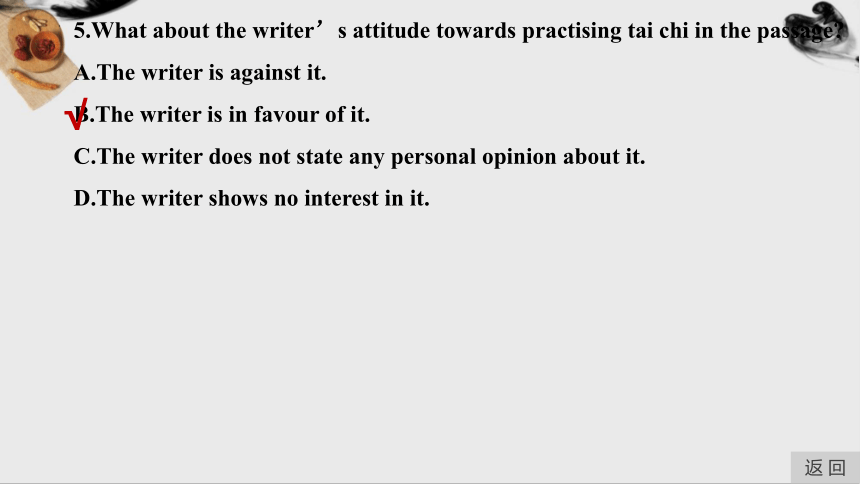
文档简介
(共26张PPT)
Unit 2 Be sporty, be healthy
Extended reading
Finding a balance:
my tai chi experience
Unit 1
Words
time
interest
time
interest
time
interest
time
interest
A
B
C
D
Choose the one which best describes the change in the author’s attitudes.
1. Scanning
amazed
hesitant
in the first few classes
after learning the basics
my love for tai chi returned
bored
satisfied
interest
time
1. Scanning
Essence of tai chi
Root
C_______________ (1)
Forwards & ____________ (4)
Up & ____________ (5)
Left & ____________ (6)
Breathing in & ____________ (7)
K__________ (8)
…
…
…
Y__ (2)
Y___ (3)
hinese philosophy
in
ang
backwards
down
right
eep balance
Scanning
breathing out
Compare and figure out the similarity.
White crane spreading its wings
Golden rooter standing on one leg
Parting the wild horse mane
Grasping sparrow tail
They both use the moves to keep balance.
Reading
1.Which one is NOT the style developed after Chen-style of tai chi
A.Yang-style. B.Wu-style.
C.Sun-style. D.Zhang-style.
Careful Reading
2.How was tai chi invented
A.Zhang Sanfeng invented it after he fought with a snake and a bird.
B.Chen Wangting invented it after imitating animals.
C.Zhang Sanfeng drew inspiration from a fight between a snake and a bird.
D.Chen Wangting based it on martial arts skills.
√
3.How did the writer feel after learning the basics of tai chi for the first few classes
A.Relaxed and peaceful.
B.Bored and muscle aches.
C.Amazed and inspired.
D.Confident and happier.
√
4.Which one is RIGHT about Chinese philosophy of yin and yang
A.They are the equal and opposite forces that make up the world.
B.Neither of them can exist independent of the other.
C.There is no shadow without light.
D.All of the above.
√
5.What about the writer’s attitude towards practising tai chi in the passage
A.The writer is against it.
B.The writer is in favour of it.
C.The writer does not state any personal opinion about it.
D.The writer shows no interest in it.
√
返 回
Finding a balance: my tai chi experience
找到平衡:我的太极拳体验
When my friend first suggested that we join the new Tai Chi Club at school, I hesitated.
一开始,当朋友建议我们参加学校新成立的太极拳俱乐部时,我犹豫了。
I always believed tai chi was for old people. 我过去一直觉得太极拳是老年人的运动。
After the first class, however, I had to admit that I had been wrong about tai chi.
不过,上完第一节课后,我不得不承认,我之前对太极拳的认识是错误的。
hesitate. vi/vt. 犹豫hesitation. n. 犹豫
hesitate to do sth. 做某事有顾虑without hesitation毫不犹豫地
admit. vi/vt. 承认,准许进入admission. n. 承认,准许加入,入场费
be admitted to/into 被…录取admit doing sth. 承认做过某事
It was amazing! One year later, I can honestly say it has had a huge effect on me physically and mentally.
太极拳实在是太神奇了!一年后,我确实可以说太极拳对我的身心都产生了巨大的影响。
Just as importantly, practising tai chi has inspired me to explore the Chinese culture behind it.
同样重要的是,练习太极拳还激励了我去探索其背后的中国文化。
inspire. vt. 鼓舞,激励,启发思考,使产生(感觉或情感)
inspiration. n. 灵感,鼓舞人心的人/事,启发灵感的人/或事
inspire sb to (do) sth 鼓舞某人(做)某事
The first few tai chi classes were fun and easy, and the moves really caught my imagination, with descriptive names like “white crane spreading its wings” and “golden rooster standing on one leg”.
前几节太极拳课非常有趣,也不难学,像"白鹤亮翅" "金鸡独立"这些很形象的招式名称确实让我兴趣满满。
When I asked my coach where these interesting names came from, he told me about the history of tai chi. 当我问教练,这些有趣的名称从何而来时,他和我说了太极拳的历史。
Zhang Sanfeng, a 13th-century Taoist, was said to have invented tai chi after drawing inspiration from a fight between a snake and a bird.
传说13世纪时,一个叫张三丰的道士从蛇与鸟的缠斗中汲取灵感,创立了太极拳。
sb. be said to have done sth. “据说某人已经/曾经做了某事”,相当于句式“It is/was said that sb. have/has done sth. ”
However, nowadays people tend to believe that Chen Wangting, a 17th-century master of Chinese martial arts, developed tai chi based on martial arts skills.
不过如今人们往往认为太极拳是由17世纪的武学大师陈王庭根据武术技巧创立起来的。
No wonder some tai chi moves are named after animals-Chinese martial arts have a long-standing practice of imitating animals.
由于中国武术中模拟动物的做法由来已久,太极拳的部分招式以动物来命名也就不足为奇了。
No wonder 难怪,不足为奇,并不奇怪
wonder. n. 惊叹,奇迹 vt /vi. 想知道,感到诧异
wonderful adj 绝妙的,令人惊叹的
Chen Wangting’s original set of moves is called Chen-style tai chi, but other styles of tai chi have since been developed, including Yang-style, Wu-style and Sun-style.
陈王庭最初创编的招式称为陈氏太极拳,后来也发展出了其他门派的太极拳,包括杨氏太极拳,吴氏太极拳和孙氏太极拳。
After learning the basics of tai chi in those first few classes, I found myself bored and aching from doing the same moves over and over again.
学完前几节太极拳基础课之后,我发现一遍又一遍重复这些招式让我心生厌倦,而且肌肉酸痛。
Luckily, my coach taught me how to relax my muscles and focus on peace of mind while performing the routine.
幸运的是,教练教会了我放松肌肉的方法,以及在日常练习时如何注意心境的平和。
达 标 检 测
1.(天津5月高考单项填空改编)-Tim has difficulty in making decisions.
-That’s it. (他还在犹豫是否要接受那份工作).
2. (全国甲卷语法填空改编) (inspire) by the Belt and Road Forum for International Cooperation held in Beijing, Cao decided to cover the route by hiking as a tribute(致敬) to the ancient Silk Road.
3. Bob often works out in the gym. he has such a good figure.鲍勃经常在健身房运动。难怪他身材那么好。
4. Through his hard work,he was admitted the key university last year.通过他的勤奋努力,去年他被那所重点大学录取了。
Words
With these requirements of tai chi in mind, I found to my satisfaction that my balance and flexibility slowly improved, that I was able to do more difficult moves, and that my love for tai chi returned stronger than ever.
将太极拳的这些要求铭记于心,我发现自己的平衡能力和柔韧性慢慢得到了改善,我可以尝试一些难度更大的招式,我对太极拳的热爱又回来了,而且比以前更强烈,这令我十分满意。
In time, I began to look into the ancient Chinese culture behind tai chi.
过了一段时间之后,我开始探寻太极拳背后的中国古代文化。
satisfaction. n. 满意,使人满意的事
satisfy. v. 使满意
be satisfied with 对…感到满意
I discovered that tai chi is deeply rooted in the Chinese philosophy of yin and yang, which are believed to form the unity of opposites.
我发现,太极拳深深地扎根于中国的阴阳学说,人们认为阴和阳构成了对立统一。
Neither can exist independent of the other; for example, there is no shadow without light.
彼此不能独立存在,比如,没有光就不会有影子。
The practice of tai chi aims to maintain the balance of yin and yang in the body through opposite movements:
练习太极拳旨在通过一些相对的动作
exist. vi. 存在,生存 existence. n. 存在,生活
exist in… 存在于…之中 exist on…靠…生存
forwards and backwards, up and down, left and right, breathing in and breathing out.
进退,上下,左右,吐纳
Eventually, tai chi brings about a state of physical balance and mental peace.
来维持人体内部的阴阳调和。最终,太极拳可以带来身心平衡的状态。
A year of practice tai chi has had a positive effect on my everyday life.
练习太极拳一年对我的日常生活产生了积极的影响。晚上我睡得更香,白天则精力更充沛。
breathe. vi/vt. 呼吸 breath. n. 呼吸的空气
breathless adj 喘不过气的
breathe in/out 吸气/呼气 breathe deeply深呼吸
I sleep better at night, and I am more energetic during the day.
我的幸福感倍增,人也更加自信。
I feel happier and more confident. Tai chi has taught me to relax my mind, enabling me to stay cool in stressful situations.
太极拳让我学会了放松心态,使我在有压力的环境下也能冷静应对。
I am sure I will continue to practice tai chi and enjoy the benefits it has brought me.
我相信我一定会继续练习太极拳,并不断地享受太极拳带给我的好处。
达 标 检 测
1.(江苏高考完型填空改编)The white-naped crane is a typical example. So scientists are trying their best to save the species from going
out of (exist).
2. The doctor told him to .
医生叫他先深吸气,然后慢慢呼气。
3. To the customers’ , the company is trying to their needs.
Words
Words
Ⅲ.选词填空
下面的短文是P25-26的课文改写,请从下表中选择合适的词汇并用其适当的形式完成此文。
inspire;admit;imitate;hesitate;balance;maintain;root;exist;peace
At first,I 14. to join the tai chi club in my school.However,it had a significant effect on me after a year’s practising.I had to 15. that it brought me a state of physical 16. and mental 17. .I could sleep well and become more confident.As importantly,I have gained much more knowledge about tai chi.It was said that Zhang Sanfeng,a 13th-century Taoist,
hesitated
admit
balance
peace
had invented tai chi through drawing 18. from a fight between a snake and a crane. Later,Chen Wangting developed it by 19. animals which is the long tradition of Chinese martial arts.Besides,I looked into the ancient Chinese culture and discovered that tai chi is deeply 20. in the Chinese philosophy of yin and yang which can not 21. independent of the other.Practising tai chi is aimed at 22. body balance of yin and yang through opposite movements.All in all,my love for tai chi has returned stronger than ever.
返 回
inspiration
rooted
imitating
exist
maintaining
1. Write an essay (120 words) to introduce and promote tai chi as
a Chinese cultural ambassador.
2. Finish the workbook.
Homework
Unit 2 Be sporty, be healthy
Extended reading
Finding a balance:
my tai chi experience
Unit 1
Words
time
interest
time
interest
time
interest
time
interest
A
B
C
D
Choose the one which best describes the change in the author’s attitudes.
1. Scanning
amazed
hesitant
in the first few classes
after learning the basics
my love for tai chi returned
bored
satisfied
interest
time
1. Scanning
Essence of tai chi
Root
C_______________ (1)
Forwards & ____________ (4)
Up & ____________ (5)
Left & ____________ (6)
Breathing in & ____________ (7)
K__________ (8)
…
…
…
Y__ (2)
Y___ (3)
hinese philosophy
in
ang
backwards
down
right
eep balance
Scanning
breathing out
Compare and figure out the similarity.
White crane spreading its wings
Golden rooter standing on one leg
Parting the wild horse mane
Grasping sparrow tail
They both use the moves to keep balance.
Reading
1.Which one is NOT the style developed after Chen-style of tai chi
A.Yang-style. B.Wu-style.
C.Sun-style. D.Zhang-style.
Careful Reading
2.How was tai chi invented
A.Zhang Sanfeng invented it after he fought with a snake and a bird.
B.Chen Wangting invented it after imitating animals.
C.Zhang Sanfeng drew inspiration from a fight between a snake and a bird.
D.Chen Wangting based it on martial arts skills.
√
3.How did the writer feel after learning the basics of tai chi for the first few classes
A.Relaxed and peaceful.
B.Bored and muscle aches.
C.Amazed and inspired.
D.Confident and happier.
√
4.Which one is RIGHT about Chinese philosophy of yin and yang
A.They are the equal and opposite forces that make up the world.
B.Neither of them can exist independent of the other.
C.There is no shadow without light.
D.All of the above.
√
5.What about the writer’s attitude towards practising tai chi in the passage
A.The writer is against it.
B.The writer is in favour of it.
C.The writer does not state any personal opinion about it.
D.The writer shows no interest in it.
√
返 回
Finding a balance: my tai chi experience
找到平衡:我的太极拳体验
When my friend first suggested that we join the new Tai Chi Club at school, I hesitated.
一开始,当朋友建议我们参加学校新成立的太极拳俱乐部时,我犹豫了。
I always believed tai chi was for old people. 我过去一直觉得太极拳是老年人的运动。
After the first class, however, I had to admit that I had been wrong about tai chi.
不过,上完第一节课后,我不得不承认,我之前对太极拳的认识是错误的。
hesitate. vi/vt. 犹豫hesitation. n. 犹豫
hesitate to do sth. 做某事有顾虑without hesitation毫不犹豫地
admit. vi/vt. 承认,准许进入admission. n. 承认,准许加入,入场费
be admitted to/into 被…录取admit doing sth. 承认做过某事
It was amazing! One year later, I can honestly say it has had a huge effect on me physically and mentally.
太极拳实在是太神奇了!一年后,我确实可以说太极拳对我的身心都产生了巨大的影响。
Just as importantly, practising tai chi has inspired me to explore the Chinese culture behind it.
同样重要的是,练习太极拳还激励了我去探索其背后的中国文化。
inspire. vt. 鼓舞,激励,启发思考,使产生(感觉或情感)
inspiration. n. 灵感,鼓舞人心的人/事,启发灵感的人/或事
inspire sb to (do) sth 鼓舞某人(做)某事
The first few tai chi classes were fun and easy, and the moves really caught my imagination, with descriptive names like “white crane spreading its wings” and “golden rooster standing on one leg”.
前几节太极拳课非常有趣,也不难学,像"白鹤亮翅" "金鸡独立"这些很形象的招式名称确实让我兴趣满满。
When I asked my coach where these interesting names came from, he told me about the history of tai chi. 当我问教练,这些有趣的名称从何而来时,他和我说了太极拳的历史。
Zhang Sanfeng, a 13th-century Taoist, was said to have invented tai chi after drawing inspiration from a fight between a snake and a bird.
传说13世纪时,一个叫张三丰的道士从蛇与鸟的缠斗中汲取灵感,创立了太极拳。
sb. be said to have done sth. “据说某人已经/曾经做了某事”,相当于句式“It is/was said that sb. have/has done sth. ”
However, nowadays people tend to believe that Chen Wangting, a 17th-century master of Chinese martial arts, developed tai chi based on martial arts skills.
不过如今人们往往认为太极拳是由17世纪的武学大师陈王庭根据武术技巧创立起来的。
No wonder some tai chi moves are named after animals-Chinese martial arts have a long-standing practice of imitating animals.
由于中国武术中模拟动物的做法由来已久,太极拳的部分招式以动物来命名也就不足为奇了。
No wonder 难怪,不足为奇,并不奇怪
wonder. n. 惊叹,奇迹 vt /vi. 想知道,感到诧异
wonderful adj 绝妙的,令人惊叹的
Chen Wangting’s original set of moves is called Chen-style tai chi, but other styles of tai chi have since been developed, including Yang-style, Wu-style and Sun-style.
陈王庭最初创编的招式称为陈氏太极拳,后来也发展出了其他门派的太极拳,包括杨氏太极拳,吴氏太极拳和孙氏太极拳。
After learning the basics of tai chi in those first few classes, I found myself bored and aching from doing the same moves over and over again.
学完前几节太极拳基础课之后,我发现一遍又一遍重复这些招式让我心生厌倦,而且肌肉酸痛。
Luckily, my coach taught me how to relax my muscles and focus on peace of mind while performing the routine.
幸运的是,教练教会了我放松肌肉的方法,以及在日常练习时如何注意心境的平和。
达 标 检 测
1.(天津5月高考单项填空改编)-Tim has difficulty in making decisions.
-That’s it. (他还在犹豫是否要接受那份工作).
2. (全国甲卷语法填空改编) (inspire) by the Belt and Road Forum for International Cooperation held in Beijing, Cao decided to cover the route by hiking as a tribute(致敬) to the ancient Silk Road.
3. Bob often works out in the gym. he has such a good figure.鲍勃经常在健身房运动。难怪他身材那么好。
4. Through his hard work,he was admitted the key university last year.通过他的勤奋努力,去年他被那所重点大学录取了。
Words
With these requirements of tai chi in mind, I found to my satisfaction that my balance and flexibility slowly improved, that I was able to do more difficult moves, and that my love for tai chi returned stronger than ever.
将太极拳的这些要求铭记于心,我发现自己的平衡能力和柔韧性慢慢得到了改善,我可以尝试一些难度更大的招式,我对太极拳的热爱又回来了,而且比以前更强烈,这令我十分满意。
In time, I began to look into the ancient Chinese culture behind tai chi.
过了一段时间之后,我开始探寻太极拳背后的中国古代文化。
satisfaction. n. 满意,使人满意的事
satisfy. v. 使满意
be satisfied with 对…感到满意
I discovered that tai chi is deeply rooted in the Chinese philosophy of yin and yang, which are believed to form the unity of opposites.
我发现,太极拳深深地扎根于中国的阴阳学说,人们认为阴和阳构成了对立统一。
Neither can exist independent of the other; for example, there is no shadow without light.
彼此不能独立存在,比如,没有光就不会有影子。
The practice of tai chi aims to maintain the balance of yin and yang in the body through opposite movements:
练习太极拳旨在通过一些相对的动作
exist. vi. 存在,生存 existence. n. 存在,生活
exist in… 存在于…之中 exist on…靠…生存
forwards and backwards, up and down, left and right, breathing in and breathing out.
进退,上下,左右,吐纳
Eventually, tai chi brings about a state of physical balance and mental peace.
来维持人体内部的阴阳调和。最终,太极拳可以带来身心平衡的状态。
A year of practice tai chi has had a positive effect on my everyday life.
练习太极拳一年对我的日常生活产生了积极的影响。晚上我睡得更香,白天则精力更充沛。
breathe. vi/vt. 呼吸 breath. n. 呼吸的空气
breathless adj 喘不过气的
breathe in/out 吸气/呼气 breathe deeply深呼吸
I sleep better at night, and I am more energetic during the day.
我的幸福感倍增,人也更加自信。
I feel happier and more confident. Tai chi has taught me to relax my mind, enabling me to stay cool in stressful situations.
太极拳让我学会了放松心态,使我在有压力的环境下也能冷静应对。
I am sure I will continue to practice tai chi and enjoy the benefits it has brought me.
我相信我一定会继续练习太极拳,并不断地享受太极拳带给我的好处。
达 标 检 测
1.(江苏高考完型填空改编)The white-naped crane is a typical example. So scientists are trying their best to save the species from going
out of (exist).
2. The doctor told him to .
医生叫他先深吸气,然后慢慢呼气。
3. To the customers’ , the company is trying to their needs.
Words
Words
Ⅲ.选词填空
下面的短文是P25-26的课文改写,请从下表中选择合适的词汇并用其适当的形式完成此文。
inspire;admit;imitate;hesitate;balance;maintain;root;exist;peace
At first,I 14. to join the tai chi club in my school.However,it had a significant effect on me after a year’s practising.I had to 15. that it brought me a state of physical 16. and mental 17. .I could sleep well and become more confident.As importantly,I have gained much more knowledge about tai chi.It was said that Zhang Sanfeng,a 13th-century Taoist,
hesitated
admit
balance
peace
had invented tai chi through drawing 18. from a fight between a snake and a crane. Later,Chen Wangting developed it by 19. animals which is the long tradition of Chinese martial arts.Besides,I looked into the ancient Chinese culture and discovered that tai chi is deeply 20. in the Chinese philosophy of yin and yang which can not 21. independent of the other.Practising tai chi is aimed at 22. body balance of yin and yang through opposite movements.All in all,my love for tai chi has returned stronger than ever.
返 回
inspiration
rooted
imitating
exist
maintaining
1. Write an essay (120 words) to introduce and promote tai chi as
a Chinese cultural ambassador.
2. Finish the workbook.
Homework
